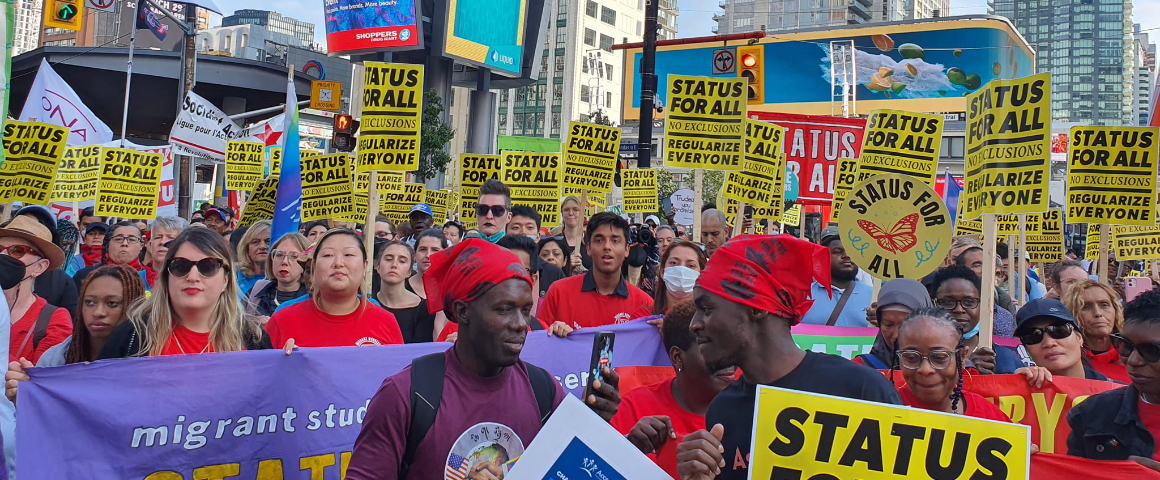By Helen Kennedy
In 1979, Bonnie Robichaud filed a sexual harassment grievance in her workplace, the Department of National Defence. A high-ranking officer told her she was the only one who had ever complained. She replied, “Good, then it should be easy to fix.” But it wasn’t.
Her recently released memoir It Should be Easy to Fix (Between the Lines Press) details the eight-year fight that began from that moment to a final decision at the Supreme Court of Canada. The ruling forced employers to be responsible for maintaining a harassment-free workplace.
Bonnie worked as a cleaner at the Canadian Forces Base in North Bay, Ontario and was a member of the Public Service Alliance of Canada. She enjoyed the job and applied for a promotion, which she won. As the only woman lead-hand, this opened her eyes to daily ridicule, humiliation and insubordination from both the foremen and the male cleaners she supervised. But she was determined to do well in her new position.
Then, she came face-to-face with one foreman in particular, Dennis Brennan, who began to harass her after she was promoted.
In the starkest chapter of the book, writing about the most vulnerable time in her life, Bonnie’s strength and resolve shine brilliantly. “This chapter was the hardest to live and the hardest to revisit to write.” There have been many reports written on the problems of sexual misconduct in the military and the DND, but nothing is as powerful as Bonnie’s written account of her lived experience.
People talk about an imbalance of power. But what does that mean? What does it feel like to have your boss – who has the say over whether or not you have a job – weekly, daily, hourly, even calling you at home, harassing and demanding attention from you. What does it feel like to live in this bubble, where no one else apparently sees what is happening to you, and you are too afraid to tell anyone, and all along you imagine that you can take care of it?
Bonnie follows this question with intimate details of Brennan’s campaign to groom her, to try and get her “to consent to being raped by him.”
The remainder of the book documents Bonnie’s struggle to be heard. After she had passed her six-month probation, she filed a grievance. The first response from her union, a local with the Department of National Defence Employees (a unit of PSAC), was to discipline her by issuing a “Memorandum of Shortcomings.” Brennan, a member of the same union, had caught wind of Bonnie’s complaint and organized a petition that sixteen members of the department (all under his supervision) had signed asking for her dismissal, along with fourteen complaint letters about her.
Penny Bertrand, a former PSAC staffer who worked on the memoir with Bonnie, stated that “supporting Bonnie (in those days in PSAC) was a subversive act.” At the book launch, she stated that the union leadership later admitted that they had failed her, but that despite this failure of the union leadership, “Bonnie prevailed. She changed Canadian law, and she changed her union. She reached out beyond her unsupportive local and the blinkered leadership of PSAC at the time. She created a grassroots campaign, wrote newsletter, bought a photocopier and continued to work in the same workplace where her harasser still worked. She is our hero.”
Bonnie’s campaign included going to union conventions and conferences, women’s committees, and social justice organizations. She also met with Jeanne McGuire, then the President of the Congress of Canadian Women. “Bonnie,” writes McGuire, “is a remarkable woman with a remarkable family which gave her their entire support. Most workers would have caved in the face of such overwhelming opposition. That she didn’t, that she persevered, that she finally won and had the strength left to write about it, is totally amazing.”
After four years, as a result of Bonnie’s relentless campaign and the supporters she mobilized, PSAC finally decided to support her, including paying her growing legal fees.
Throughout the ordeal, Bonnie didn’t lose faith in the value of union membership. She went to any and all union courses she could, including steward classes that fortified her knowledge of what was right or wrong. For years after the initial complaint, aware that supervisors were eager to find any reason to fire her, she documented everything she did in the workplace so that there could be no reason for dismissal.
Bonnie won her struggle over forty years ago. The Supreme Court decision gave workers facing harassment on the job, and the unions that represent them, grounds for grieving their employers for failure to maintain a harassment-free workplace.
Unlike Bonnie, many women lack the courage or stamina to take the first step and launch a complaint or file a grievance. A study recently released by the Canadian Labour Congress and Western University reveals that one in two Canadian workers face sexual harassment on the job and that very few report the harassment in the belief that reporting it would be pointless or become a nightmare. Unfortunately, it’s still too often left to the individual workers to raise the issue.
Encouraging members to participate in union education, to learn about management’s duty to ensure a harassment-free workplace, is of central importance. Unions themselves should be more proactive in exposing systemic conditions that give rise to harassment in workplaces.
The recently released Arbour Report on sexual misconduct in the military calls out the “deeply deficient culture” that permeates the Canadian Armed Forces. A different retired Supreme Court Judge, Marie Deschamps, came to the same conclusion six years earlier finding sexual misconduct to be “endemic” in the military. That clearly spills over to the Department of National Defence, where many jobs are filled by military personnel. No doubt many women in DND workplaces are currently reliving struggles similar to Bonnie’s.
Sexual harassment should be easy to fix. We owe a debt to Bonnie for the legal win, but also for the example of how to win. It Should be Easy to Fix teaches us that it takes a broad-based campaign to actively challenge systemic power dynamics in our workplaces.
[Photo of Bonnie Robichaud: Workers History Museum]
Get People’s Voice delivered to your door or inbox!
If you found this article useful, please consider subscribing to People’s Voice.
We are 100% reader-supported, with no corporate or government funding.




